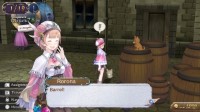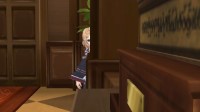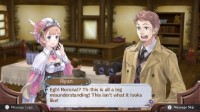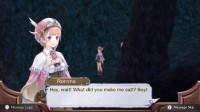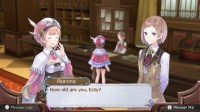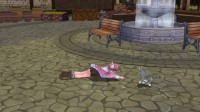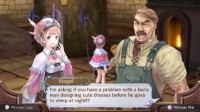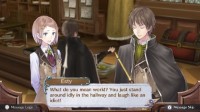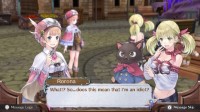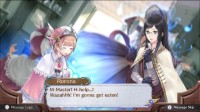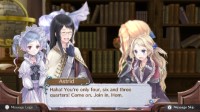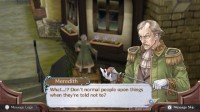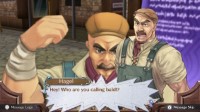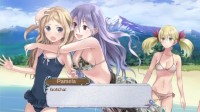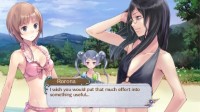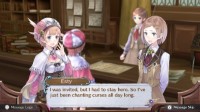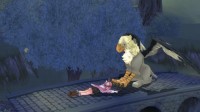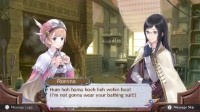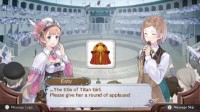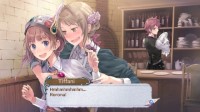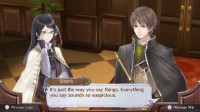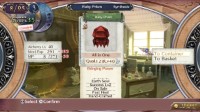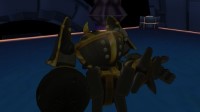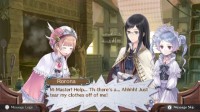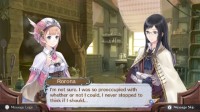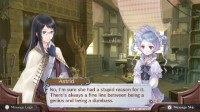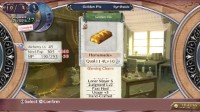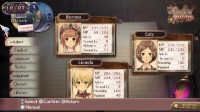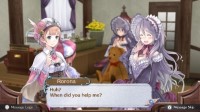Atelier Rorona
Playtime: 41.2 Hours
Finished 09 October 2023.Played Rorona DX on Switch; previously started Rorona Plus on the Vita in 2019 or so but never finished - don't remember exactly when I stopped in that run. Finished the main game (3 years) but did not do any overtime. I achieved the True End flags, which also means that I could select Good/Normal ends if I wanted to. I also got the Pie Master ending flags, but I didn't complete any character flags except Esty (got pretty close on a few others though!). My main party was Rorona/Esty/Lionela, all Level 50 and fully equipped with endgame/postgame gear. I also spent some time training Cordelia and Iksel too, both at max friendship but without outdated equipment.
As far as the game's base objectives are concerned, I've managed to basically full clear the game (at least for NG no overtime). I managed to get all 120 assignment stars with a 120 quality ruby prism, finished every single optional request (Use Meteor in Assignment 6 was very difficult). I've fully unlocked and explored every location, defeated every regular-time boss, and even managed to destroy the Iron Giant at the bottom of Orthogalaxen for fun. Additionally, I've crafted every pie (for the Pie Master ending) and almost every single item in general (including Gold) except the Victory Charm, God's Supper, and a few event items with characters I didn't complete flags for: Hagel's Fantastic Wig, Tantris's Handmade Instrument, Lionela's Mystery Potion. Also, friendship is not 100 across the board as is to be expected, and most character flags are incomplete with at least one or two events missing each. Not bad for a first playthrough though!
If I decide to come back to this game again (this would theoretically be quite high on the replay list for the Atelier games), I'll do a NG+ playthrough first to try completing the ending flags instead of starting overtime. That might be fun someday, but I've got the rest of the series available to me for now.
The first time I tried playing this back in the late 2010s (maybe 2018/2019?), and I ultimately postponed it about halfway through the game because I didn't really understand the alchemy too well and the time limit mechanics were quite stressful when paired alongside high-pressure university work (going into some of my most difficult semesters). I've always had it in the back of my mind ever since to continue that playthrough someday, or otherwise give it another try from the start; I guess that happens to be now, in late 2023. I kind of turned this on at a whim after being a bit overwhelmed with Ryza 3's giant open world (not sure what to do, craft in first area or push ahead in story). I did have to restart since the PSV1000 memory card got partially (?) corrupted and I did end up buying the Arland trilogy on the Switch again to get the updated DX versions (and to have them on a better-supported platform using MicroSD as opposed to proprietary cards). Nevertheless, I could not be happier that I decided to do this. After some initial growing paints, I absolutely loved pretty much all of my time with this game and would have more seriously considered going even further if I didn't have 12+ more Atelier games to play after this. This is likely my favorite game in the series now.
The Arland trilogy is arguably the most iconic in the Atelier franchise as the beginning of the "modern" Atelier games, with a much heavier focus on the alchemy than Marie, Iris and Mana Khemia. It's also the first time in the series that the same setting has been used throughout a trilogy featuring different characters' journeys over a span of time, which has generally been followed ever since. Beyond these, I find the Arland setting to have a nearly indescribable charm to it that is strongly exhibited in this game. For such a simple and utilitarian setting, it still manages to feel quite alive through the few vendors and other NPCs that you can interact with. The plot and characters of Rorona specifically are also especially entertaining because there is a slight "edge" (term used very lightly) to it that grants it an amusing, lighthearted tone, yet with deeper implications. Rorona is forced to operate the workshop essentially as an indentured servant because of her family's debt to Astrid and will lose the closest thing she has to a home if she fails. This occupation forces her to make many dangerous journeys for rare and expensive ingredients as a result (plotwise, at least - as a player every excursion should ideally be carefully planned). Also, she unknowingly deals with a saboteur in Meredith, who is trying to force her workshop closed. It's certainly not some story about the destruction of the world and the defeat of God, and I actually consider it a massive strength of this game to have such an interesting story without resorting to that age-old JRPG trope. Instead, the drama is highlighted in Rorona's very personal experience with her workshop and her growth as an alchemist to overcome these great challenges, instead of once again resorting to the power of friendship to solve all of her woes. It's executed immaculately here, but also comes up in the other Arland games too (and potentially beyond).
Speaking of the characters - I know that some of the side characters have already been Atelier staples before the Arland games, but pretty much all of them are really interesting. Hagel (best theme btw), Tiffani, Esty, Pamela, Sterk, etc. all have their own quirks and very unique identities within the game. I like how the game doesn't try to make any of them out to be some paragon of a character; from the in game events, Esty has plenty of of grievances not being able to find a partner, Sterk is somewhat disappointed by his incredibly boring duties as a knight, wishing to more actively fight and help people, Hagel (as usual) has some issues with his lack of hair, though he'd never admit it. Other party members like Cordelia, Iksel, Lionela, etc. all have similar quirks and difficulties that they gradually work through as you view more and more of their character events. What I love about the way character development is handled here is that much of the development isn't from Rorona actively seeking to help her companions and other acquaintences, but rather a result of Rorona's natural reactions with these characters. Maybe it's a difficult distinction to properly articulate, but in many other JRPGs the writing tries to make it look like the main character is the perfect person who can magically solve all of these personal issues and this game very specifically avoids this scenario. On the subject of Rorona, I love her character; she's cutesy but isn't some kind of prim-and-proper princess, which opens the door for lots of goofy comedy without the stereotypical embarrassed anime moments (TM). She's also dumb as a brick, which honestly just makes things even funnier - sometimes she'll fumble her remaining brain cell while talking to someone (or something, in the case of a certain pie...) and cause some extreme chaos as a result. While I don't want every character to be a carbon copy of her, the specific character traits that comprise Rorona's personality and character hit a perfect sweet spot between likeable without feeling subdued. So far, Totori has some of that same DNA and I'm quite happy about it there, too.
When talking about gameplay, probably the most important thing to note is the time limit, which is ultimately what separates the core Arland trilogy from the more recent series. It wasn't introduced in this trilogy (I believe Iris and MK both had limits), nor is it the last (Ayesha, E&L, Firis all have limits to some degree as well), but that mechanic tends to be so trivial after Arland to be almost pointless. In this game, it's a important gameplay element that rests at the very core of the experience - and after playing through it, I think it is vital for building the intended feel of the game. Here's the thing: in Rorona, I think the time limit is nearly perfectly paced and balanced around the objectives you get per 3-month period, and the two intertwine together to create a very fluid difficulty system that can be as easy or as difficult as you want it to be. The main objective is almost always completely trivial to finish (and 10-star, at that), but there is more to do in Plus/DX. A new set of optional objectives was added per term with 12 tasks each time; each grants you a stamp on a bingo board, requiring 8 optionals to fill out (the 9th is from the main objective - again, very easy). Trying to just barely fill out this bingo board is very doable, but adds an extra degree of challenge while giving you some guidance for what you can do with your extra time in preparation for the next assignments. If trying to completely clear all of the optional objectives, the planning required is quite a bit harder and represents a solid challenge, at least for a first playthrough. Specifically, Assignment 6 has the hardest one to complete in the game - Use Meteor - which is just BARELY achievable with impeccable timing in a new game since it requires a very long trek to a faraway area that you can just barely unlock a month and a half before the deadline through an extremely obscure (and money-consuming) method. Additionally, the hard time limit does a great job at dictating the pace of the plot, and thus the pacing of new mechanics, crafting items, new areas, and much more. The game doesn't have to consider that you might grind to max level before entering the second area, and the player won't have much opportunity to get pissed that they could have unlocked a new mechanic (like wholesaling) just one or two events after wherever they were previously stuck. I don't know how well this could translate to the rest of the series, but from my experience everything works almost flawlessly in Rorona at least. It's even a central point for why I'm interested in NG+ to begin with, since certain things can be much more easily streamlined the second time through - giving me more time for all of the events I missed!
So obviously the most important part of every Atelier game is the actual synthesis mechanics. Where Ryza had a very complex material loop system that allowed you to fuse massively powerful items with a ton of crafting materials, Rorona abides by a simpler and much stricter system; each item takes a certain number of components to craft, no more and no less. This is a fairly rudimentary system as would be expected from such an old game in the series, but balances very well against the time limit mechanics which in turn requires more strategy for where you gather, what you buy and how much you can craft in a particular timeframe. There's some depth to it as well, in that you might want to increase the number of items you craft in order to use enough items for all the traits you want. On the other hand, you may want to craft less in order such that you can use a smaller number of high-quality ingredients to push a higher-level effect on the final item - or so you don't use too much mana and fatigue Rorona, requiring a few rest days to recover. Also, to remedy the stress of having to craft items for your main task, optional task, requests, and your own gear synthesis, the game provides some vital QoL partway into the game. Firstly, you have the Hom that can auto-synth or auto-gather items as you need them, which can effectively auto-complete your tasks for no effort (did this for Arland Crystals). Secondly, you have wholesaling, which incentives the creation of high quality goods that you can then duplicate through your local traders. With these two, much of the immediate stress in balancing out your crafting sessions is alleviated, making the game so much more relaxing right at the point where the game starts to cool off from the mid-game difficulty spike. These are introduced at just around the right time to be significantly useful as the game starts to ramp up in difficulty, while still requiring you to improve your skills beforehand to make the most out of these new opportunities.
Lastly, to mention the combat, gathering, and field mechanics. They aren't really worth noting for the most part honestly. Combat is extremely simple and mostly quite easy outside of a few tougher bosses late in the game (Black Dragon, Demon, and Iron Giant were the toughest for me) - these bosses generally come down to the quality of your healing items, because any fight you can sustain is a fight you can easily win. Rorona is the only one who can use items because she's holding the gathering basket, which is fair. Having a chance to use some of the offensive and healing items you've worked so hard to craft - particularly elixirs and meteors - does give a bit of a rush for the hardest bosses though. Field gathering is also quite simple and not really worth mentioning, though some spots tend to have specific ingredients that come in handy. Also, dunkelheits are only harvestable from one area for half a month twice in the game (Month 11 before 11/25, Year 2 & 3). There's a number of items you can actually use out in the field, but the only ones I found necessary were the air drops (exploring underwater), some strong bombs (destroy rocks and barriers), and windriders (teleport home). The others didn't really come in handy too much. This aspect of the game is probably one of the most straightforward, but I don't see it as needing any further development since I think it works great the way it is now - pushing it too much further would have overcomplicated the game, I think.
Not everything can possibly be perfect in a game like this, but my list of complaints is truthfully quite small and mostly comprised of miscellany. My trouble with the original Rorona on PS3 would probably be higher if I had played it, but the rebalancing done for Plus/DX addresses so many of the original concerns. Firstly, some more save points would have been nice, especially for long gathering trips - I don't really like not being able to save until I finish everything and return to the atelier. Secondly, I really hate the events that randomly sap a number of days out of your schedule with no warning, and with no way to avoid them. The Y1/Y2 end-of-year festivals are fine because they are clearly noted in the schedule (shorter deadlines), but the random 7 days or so you lose for the swimsuit trip to Lake Nabel, and the other for the Raptorstein can easily throw off someone's schedule and kind of ruin a part of the playthrough. Other times, walking into Sunrise Cafe or other areas will auto-trigger an event that eats a day, which can be significant if running a tight schedule before the deadline. What's worse is that these unavoidable events can actually force-fail any requests you've taken that are due during the events, which can also be a big problem. There are probably more that I don't remember at the moment but they clearly wouldn't be too much of a gamechanger in that case; aside from this short list, almost everything else just works beautifully in this game.
